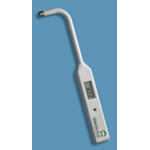
Two companies that spun out from the Health Science Center will receive grants from the $200 million Texas Emerging Technology Fund, Gov. Rick Perry announced May 31 in Austin. CardioSpectra Inc., which represents a collaboration of the Health Science Center and UT Austin, and Xilas Medical Inc. were among four companies awarded grants from the Fund in this round.
“This is a great endorsement by the Governor’s Office of what we are doing here in San Antonio,” said Francisco G. Cigarroa, M.D., president of the Health Science Center. “It is a further demonstration that we have the intellectual capital needed to drive a new set of advances to benefit the health status of society.”
“This demonstrates the significant level of innovation that exists in the research enterprise at the Health Science Center,” said Brian Herman, Ph.D., vice president for research. “At the present time, we have 10 spin-off companies in our portfolio, and all of these are exciting companies whose technologies promise to improve the health and well-being of the people of the state of Texas.”
The San Antonio grant winners focus on two of Texas’ most prevalent diseases, cardiovascular diseases and diabetes.
CardioSpectra, co-founded by Marc D. Feldman, M.D., associate professor of medicine, physiology and engineering at the Health Science Center, and Thomas E. Milner, Ph.D., associate professor of biomedical engineering at UT Austin, is using a combination of physics and biology to improve the detection of vulnerable plaques in arteries. The technology under study is called Optical Coherence Tomography (OCT). CardioSpectra received $1.35 million from the Emerging Technology Fund.
“OCT, which is light based, is ideal for detection and diagnosis of conditions that light can penetrate,” Dr. Feldman said. “MRI and CT scans are more useful for solid organs like the liver, but OCT is ideal for skin, GU and GI cancers; eye pathology; and plaque rupture in the heart and brain causing heart attacks and strokes, respectively. Our focus currently is the heart, and predicting future heart attacks.
“Currently, clinicians do not have the ability to see individual cells in a live patient,” Dr. Feldman said. “Individual cells currently can only be viewed by pathologists in histology slides. OCT will afford the ability to see individual cells in the live patient without cutting any tissue – or molecular imaging.”
Xilas Medical, which will receive $1 million, is bringing to market several technologies, including one developed by C. Mauli Agrawal, Ph.D., P.E., professor of orthopaedics at the Health Science Center and interim dean of the College of Engineering at UTSA.
Studies have shown an increase in pressure and temperature prior to foot tissue breakdown. The portable TempTouch™ is a dermal thermometer that can be used by the patient on a daily basis to detect pressure points that can lead to ulceration, infection and possible amputation. This device, designed to be easy to use, can provide an early warning to a patient to seek appropriate foot care.
“This is important, because studies show there is a four- to five-day delay from when a patient notices something to when he or she goes to the doctor,” said Lawrence Harkless, D.P.M., professor of orthopaedics and chief of podiatry at the Health Science Center. “That is when the damage is done, the bacteria proliferate, and infection spreads and worsens, leading to amputation because of tissue destruction.”
Xilas will provide 1,000 TempTouch™ devices for care of Medicaid- and non-insured members of the community. The patients are seen by Health Science Center faculty and residents in diabetic foot clinics of the University Health System. Later, the project will be expanded from San Antonio to community health centers in the Lower Rio Grande Valley, Dr. Harkless said.
“Diabetes research is one of our strengths at the Health Science Center,” said Randy Goldsmith, Ph.D., assistant vice president for technology transfer and economic development. “This illustrates exactly what we hope to see happen over time – our research translated into viable market products that bring solutions to human conditions.”
Other Emerging Technology Fund grant recipients announced May 31 were CorInnova Inc. of College Station, which is developing a device to reduce instances of congestive heart failure, and Molecular Imprints of Austin, which is developing a way to fabricate nano-scale devices and components.

